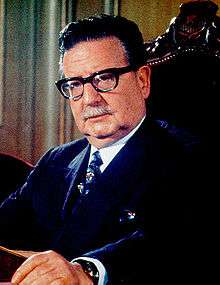Popular Unity (Chile)
Popular Unity Unidad Popular | |
|---|---|
 | |
| Founded | October 9, 1969 |
| Dissolved | 1981 |
| Preceded by | Popular Action Front |
| Headquarters | Santiago |
| Political position | Left-wing |
| Colours | Red |
| Anthem | Venceremos |
The Popular Unity (Spanish: Unidad Popular, UP) was a left-wing political alliance in Chile that stood behind the successful candidacy of Salvador Allende for the 1970 Chilean presidential election.
History
Successor to the FRAP coalition, Popular Unity originally comprised most of the Chilean Left: the Socialist Party, the Communist Party, the Radical Party, the Social Democrat Party, the Independent Popular Action and MAPU (Movimiento de Acción Popular Unitario). They were later joined in 1971 by the Christian Left and in 1972 by the MAPU Obrero Campesino (a splinter group). UP also initially included the moderate Party of the Radical Left, but in 1972 it joined the opposition (inside the Confederation of Democracy).
UP's leader, Salvador Allende, was a Marxist who co-founded Chile's Socialist Party. His slight plurality in the election resulted in his confirmation as president by the National Congress of Chile. The loose and conditional support from the Christian Democratic Party that made this confirmation possible soon disintegrated, as did centrism of any viable kind in an atmosphere of increasing political polarization. The Revolutionary Left Movement clashed with the conservative and establishment forces, while armed right-wing elements plotted to destabilize the government with support from the Nixon administration. The Unidad Popular coalition itself experienced political conflicts. Generally, the Communist Party, the Radical Party and later MAPU/OC advocated more cautious policies, whereas a part of the Socialist Party supported more radical changes and were often supported by MAPU and Christian Left.[1][2]
The Pact of the Popular Unity (Pacto de la Unidad Popular) was signed on 26 December 1969 in Santiago by following representatives of political parties:
- Luis Corvalán, General Secretary of the Communist Party
- Aniceto Rodríguez, General Secretary of the Socialist Party
- Carlos Morales, President of the Radical Party
- Esteban Leyton, General Secretary of the Social Democratic Party
- Jaime Gazmuri, General Secretary of the Popular Unitary Action Movement
- Alfonso David Lebón, President of the Independent Popular Action
In August 1973 the Christian Democrats cooperated with the right-wing National Party in the congressional protest that set the stage for the Chilean coup of 1973, the effective end of the UP government and —for 17 years— of democracy in Chile.
Allende's Presidency

Salvador Allende's election in 1970 represented several important developments internationally and domestically. He was the first democratically elected socialist leader in Latin America. In contrast with Fidel Castro's violent revolution from below, Allende proposed a peaceful transition to socialism through existing governmental structures: a revolution from above. Popular Unity had the support of the people, and this support only grew. Allende was elected with 36% of the popular vote in 1970. Five months into his presidency, that number had grown to 49%.[3] This was where his support peaked. Following severe inflation and food shortages, Allende became increasingly unpopular until there was a successful coup on September 11, 1973, and the leader of the coup, Augusto Pinochet, took power.
The UP's early economic success was short lived. Despite winning the presidential election, the legislative and judicial powers were still held by the opposition. Without their support, Allende was unable to modify the tax system or authorize the necessary budgets. The United States, under the Nixon administration, prevented the renegotiation of national debt and placed an embargo on goods from nationalized companies. In response to these efforts, Allende expanded the money supply, and inflation skyrocketed. Food shortages worsened as the embargo and market inefficiency limited imports and access to food.[3]
Platform
The UP promoted the peaceful transition to socialism. This primarily involved the nationalizing of certain industries and agrarian reform. The UP intended to nationalize basic sources of wealth held by foreign companies and internal monopolies. This included mining of copper, nitrate, iodine, iron, and coal; the country's financial system, especially private banks and insurance companies; foreign trade; production and distribution of electricity; air, rail, and maritime transportation; all petroleum based goods; iron, steel, cement, and paper. Agrarian reform would include the expropriation of latifundios, or large holdings of land. In addition to these policies, the UP promoted improved social security and public health, an improved and expanded housing sector, gender equality, and the extension of the right to organize unions.[4]
Policies
The expropriation of the first company, a textile factory, was announced on December 2, 1970. Others followed over the next several months, and the opposition congress unanimously approved a constitutional reform for the nationalization of copper and other resources, expropriating large foreign companies without compensation. There was considerable redistribution of income and falling unemployment. Only the banks resisted the UP’s attempts to nationalize them.[3]
The main beneficiaries of both Eduardo Frei and Allende Land Reform were the peasants already working the land. The process was similar to that of sharecropping, in which the owners of the land pay people to work the land. The peasants working the land keep a percentage of the profit, the rest goes to the owner. The reform policies rarely addressed the small land holders, turning them against the Allende. Although the UP did not gain full power of the government with Allende’s election, it did gain the administrative and economic ability to limit the bourgeoisie through expropriations and strengthen the urban proletariat and peasantry. One large difference between Christian Democrat and Popular Unity governments was their reactions to tomas, or seizures of land by the peasants. Frei’s government would not expropriate any land that had been seized, but Allende accelerated expropriations. This led to a massive movement to seize land. In 1967, there were 9 seizures, but in 1971, there were 1,278.[5] Half of these seizures occurred on farms below the land limit of expropriation. The government established peasant councils that were supposed to represent peasant interests. Their failure in doing this played a large role in Allende’s loss of favor among the peasantry. A series of programs, including pay equality, resulted in diminishing incentives to work, and productivity fell. The agrarian reform under Popular Unity resulted in a significant rise in peasant standard of living, an increase in peasant political awareness and activity, and the expropriation of all latifundios. It also was not as extensive, or as successful, as it was expected to be, and Allende lost their potential support.[5]
Composition (1969–1973)
Electoral results
| Chamber of Deputies | |||||
| Election year | # of overall votes |
% of overall vote |
# of overall seats won |
+/– | |
|---|---|---|---|---|---|
| 1973 | 1,605,170 (#2) | 44.23 | 63 / 150 |
| |
| Senate | |||||
| Election year | # of overall votes |
% of overall vote |
# of overall seats won |
+/– | |
|---|---|---|---|---|---|
| 1973 | 940,512 (#2) | 42.75 | 11 / 25 |
| |
Symbols
 1969–1972
1969–1972 1972–1973
1972–1973 1973
1973
See also
References
- ↑ Kenneth M. Roberts, Deepening democracy?: the modern left and social movements in Chile and Peru, p.301
- ↑ Simon Collier, A History of Chile, 1808-1994
- 1 2 3 Harnecker, Marta (October 2003). "Understanding the Past to Make the Future: Reflections on Allende's Government". web.a.ebscohost.com. Historical Materialism. Retrieved 2016-11-19.
- ↑ "Popular Unity Government: Basic Program". web.a.ebscohost.com. NACLA Report on the Americas. March 1971. Retrieved 2016-11-19.
- 1 2 Kay, Cristobal (1975). "Agrarian Reform and the Transition to Socialism in Chile, 1970-1973". The Journal of Peasant Studies. 2 (4): 418–445.
External links
- Salvador Allende's "Last Words" Spanish text with English translation. The transcript of the last radio broadcast of Chilean President Salvador Allende, made on September 11, 1973.
- A brief history of Chile. Covering the earliest known humans in the area until the turn of the century.
- Augusto Pinochet. Britannica summary of Pinochet's life.